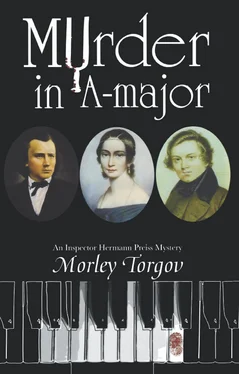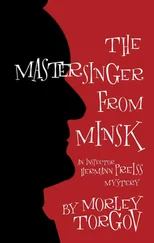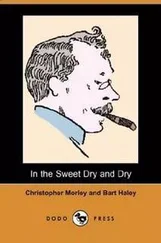Morley Torgov - Murder in A-Major
Здесь есть возможность читать онлайн «Morley Torgov - Murder in A-Major» весь текст электронной книги совершенно бесплатно (целиком полную версию без сокращений). В некоторых случаях можно слушать аудио, скачать через торрент в формате fb2 и присутствует краткое содержание. Жанр: Исторический детектив, на английском языке. Описание произведения, (предисловие) а так же отзывы посетителей доступны на портале библиотеки ЛибКат.
- Название:Murder in A-Major
- Автор:
- Жанр:
- Год:неизвестен
- ISBN:нет данных
- Рейтинг книги:5 / 5. Голосов: 1
-
Избранное:Добавить в избранное
- Отзывы:
-
Ваша оценка:
- 100
- 1
- 2
- 3
- 4
- 5
Murder in A-Major: краткое содержание, описание и аннотация
Предлагаем к чтению аннотацию, описание, краткое содержание или предисловие (зависит от того, что написал сам автор книги «Murder in A-Major»). Если вы не нашли необходимую информацию о книге — напишите в комментариях, мы постараемся отыскать её.
Murder in A-Major — читать онлайн бесплатно полную книгу (весь текст) целиком
Ниже представлен текст книги, разбитый по страницам. Система сохранения места последней прочитанной страницы, позволяет с удобством читать онлайн бесплатно книгу «Murder in A-Major», без необходимости каждый раз заново искать на чём Вы остановились. Поставьте закладку, и сможете в любой момент перейти на страницу, на которой закончили чтение.
Интервал:
Закладка:
Once again, I found myself speechless. She had handed over the papers in what was intended to be a gesture of surrender, and I had taken them from her mechanically, my mind still frozen in disbelief. Even my body seemed incapable of reacting to this turn of events, my shoes feeling as though the soles had been nailed to the floor. Was she telling me the truth? Or was she a devilishly clever liar? And then again, given what I myself had done at the bridge, did it really matter?
“Well, Inspector?” she said, again with that remarkable calmness.
Slowly, I found my tongue. “There is one problem, Madam Schumann…from my standpoint, that is: The tuning fork? Well, it is no longer in my possession. It lies at the bottom of the Rhine-”
Clara Schumann's eyes grew suddenly large. Her mouth was agape.
“I put it there,” I said.
“You did what? ”
“I disposed of the tuning fork.”
You mean…by accident? ”
“On the contrary. I deliberately threw it into the river.”
“I–I don't understand, Inspector.” Her expression now was one of disbelief. “Surely what you did flies in the face of what you are duty-bound to do, I mean, to solve mysteries.”
“Perhaps,” I said, “but then again, some mysteries are not meant to be solved. At least, that is what I'm beginning to believe.”
I moved away from the armoire and returned to the fireplace on the other side of the drawing-room. “That's a fine blaze,” I said, “and very heartwarming on a day like this.”
She remained near the armoire watching me.
Almost in a whisper, I said, “Dust to dust, ashes to ashes.” Then I knelt down and laid Adelmann's papers carefully atop the burning logs, staying in that kneeling position until I was certain that the flames had licked their way well into the bundle, the sheets browning and curling and disintegrating and rising up into the chimney in bright orange flecks.
I stood up, pulled my coat securely around me (by now the warmth of the fire had made it dry and comfortable) and said, “And now, goodbye, Madam Schumann. I hope we may meet again one day…under clearer circumstances.”
She came toward me and offered her hand which, without daring to look up at her, I kissed. I left her standing there, in the middle of the drawing-room, and let myself out. It would be-I felt certain-the last time I would ever find myself in that house.
* * *
That evening, again warmed before a blazing fire-this time in the peace and quiet of Helena Becker's sitting room-I indulged in a confession of my own. I related in precise detail each and every sin I had committed on this cold, wet, miserable day in Düsseldorf.
Without being coaxed or cajoled, I admitted that I had renounced-at least for the present-whatever credible claim I might have to the moral high ground that was supposed to be a police officer's habitat. “Some day, Helena,” I said, my mood wistful, “when I'm long into my dotage and have nothing to lose, I see myself parked in some working-class tavern and, over a glass or two of beer, raising the eyebrows of fresh-faced young colleagues with tales of my misdeeds. But do you think they will understand?”
“Not for a moment,” Helena said. “Nor would you have understood until the Schumanns turned your life upside down. Life is really about disorder, isn't it?”
“Perhaps I ought to become a monk, then. Or at least retire to a monastery as Franz Liszt proposes to do, and spend an orderly year in search of my soul.”
“Hermann, you are expert at many kinds of investigation,” Helena said (I had the feeling she was trying with difficulty not to laugh at me), “but men will land on the moon before you discover the whereabouts of your soul.”
That said, my confessor, in her own way, offered me absolution, gracefully given, and gratefully received.
Once again my father-or to put it more accurately, the man whom I was brought up to regard as my father- proved to be wrong. There was such a thing as a good surprise.
Chapter Thirty-Eight
The English have a saying: Leave well enough alone . Ironically, it's a piece of advice the English notoriously fail to heed, judging by their penchant nowadays for marching, or sailing, into far-off places, ignoring the local populations there, planting their Union Jacks in foreign soil, and proclaiming ownership of that soil. Frankly, it's a characteristic of the English that I've always admired, that ability to preach one thing but do the very opposite. Which accounts for what I did one day, but let me explain: After my final encounter with Clara Schumann, the day I dropped the tuning fork into the Rhine then, as an encore, tossed Adelmann's monograph into the fire, I told myself that my involvement with the Schumanns, while not neatly settled by any means, should be considered at an end. I wanted nothing more to do with them, or with their circle for that matter.
Leave well enough alone.
The Commissioner's irritation with me faded, and I found myself restored in his sight now that I had begun to throw myself into my regular line of police work with greater devotion. Several memoranda of praise actually landed on my desk from my superior, although I've no doubt he penned these encomiums bearing firmly in mind my connection to Baron von Hoffman)
Helena Becker swore I had changed for the better, despite breaching my sworn duty as an officer of the law, and her tenderness towards me now carried with it a tinge of respect, something I confess I hadn't always earned in the past in my dealings with her.
As for my relationships with my fellow officers, I became less stand-offish. After spending so much time exposed to the pretensions, jealousies, and unabashed backstabbing that prevails in Düsseldorf's cultural world, I suddenly found the simplicity of Düsseldorf's taverns refreshing. There is more honesty in beer than in wine.
Leave well enough alone. And that is what I did; I left well enough alone.
Then, some fifteen months after Maestro Schumann's arrival at the hospital at Endenich, I awoke one morning before dawn after an inexplicably restless night and, as though sleepwalking, dressed, left my rooms, hailed a cab, and found myself at the train station purchasing a ticket for passage on the recently installed rail line to Bonn. Several hours later, still in a trance-like state, I took a cab from the centre of Bonn to the outskirts, Endenich, instructing the driver to take me to Number 182 Sebastianstrasse. I had not been in Bonn for a number of years, and under ordinary circumstances, I would have taken in the sights like a typical tourist as the horses clopped along, but I recall little or nothing about that carriage ride until the driver pulled into the stone-paved entranceway, swung round in his perch and, giving me a sad-eyed look, asked, “Do you need some assistance, sir? I can call for help if-”
Only then did I snap fully awake, or so it seemed. “No, no, I am not a patient,” I quickly assured him, though I'm afraid my protestation was not convincing, since he continued to look at me with nothing less than pity. “I'm here to visit a patient, but thank you anyway.”
If the hospital I was about to enter was a place for the storage of the insane, one would never have known it from the look of the place. Apart from a discreet bronze plaque which announced that it was a hospital (in fact the only private mental hospital in the Rhineland), everything about the building and the acres of ground upon which it sat suggested that here was an estate anyone of noble birth or recently acquired wealth would be proud to inhabit, an estate where great parties could be given and where, on a fair June afternoon such as this, on lawns upholstered with patches of meticulously arranged flowerbeds, guests could meander as though they hadn't a care in the world, except to locate the next glass of Champagne or a canapé.
Читать дальшеИнтервал:
Закладка:
Похожие книги на «Murder in A-Major»
Представляем Вашему вниманию похожие книги на «Murder in A-Major» списком для выбора. Мы отобрали схожую по названию и смыслу литературу в надежде предоставить читателям больше вариантов отыскать новые, интересные, ещё непрочитанные произведения.
Обсуждение, отзывы о книге «Murder in A-Major» и просто собственные мнения читателей. Оставьте ваши комментарии, напишите, что Вы думаете о произведении, его смысле или главных героях. Укажите что конкретно понравилось, а что нет, и почему Вы так считаете.












